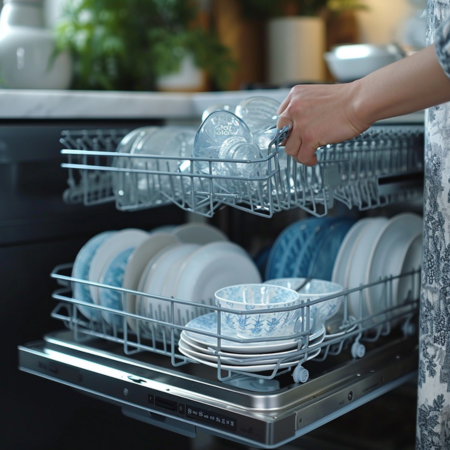Dishwashers, a common household convenience, are often taken for granted.
They efficiently clean our cutlery, plates, and glasses, saving us time and effort.
But have you ever wondered how long do dishwashers run?
The answer is not as straightforward as you might think.
Various factors, including the type of dishwasher, the selected wash cycle, and the model’s age, can all influence a dishwasher’s running time.
This article aims to shed light on the average duration of a dishwasher cycle and discuss the elements that may cause this to vary.
Key Points
- Type of Dishwasher: Different dishwasher types, such as built-in, portable, or countertop models, may have varying cycle times due to design and functionality differences.
- Selected Wash Cycle: The chosen cycle significantly impacts how long the dishwasher runs, from quick to intensive.
- Age of the Model: Newer models often have more efficient cycles and may run shorter than older, less efficient units.
- Load and Soil Level: Heavily soiled dishes or a full load may require a longer wash cycle to ensure thorough cleaning.
How Long Do Dishwashers Run?
On average, a dishwasher cycle can take 1 to 4 hours. This range is broad because it depends on several factors.
A light wash option is typically the fastest. It can be completed in about an hour. This cycle is perfect for lightly soiled dishes.
Standard wash cycles take a bit longer. On average, they run for about 2 hours.
The heavy wash cycle is for very dirty items. This might take up to 4 hours.
The model and age of the dishwasher also affect cycle duration. Older models tend to take longer. Newer models have features that can reduce run-time.
Remember, your dishwasher aims to clean thoroughly. Sometimes that requires a longer run time. It’s a small price for clean, sparkling dishes!
Dishwasher Cycle Time Comparison
Here is a comparison of various dishwasher cycles and their typical durations:
- Light Wash: This is the quickest cycle, typically completed within about 1 hour. It’s perfect for dishes with light soiling.
- Standard Cycle: A bit more thorough, the standard cycle usually runs for approximately 2 hours, ideal for everyday dishwashing.
- Heavy Wash: This cycle is designed for heavily soiled items and might take up to 4 hours. The duration is longer to ensure a deep clean.
- Quick Wash: A speedy option, the quick wash cycle can be finished within 15 to 20 minutes. However, it’s only suitable for lightly soiled dishes that don’t need intensive cleaning.
- Rinse and Hold: This short cycle (about 10-15 minutes) is used to rinse dishes that will not be washed immediately, preventing food residues from drying out.
- Sanitize Cycle: Often paired with other cycles, the sanitize option can add up to 30 minutes to the cycle time but ensures a higher level of sanitation by killing up to 99.9% of bacteria.
- Auto-Cycle: Time varies widely based on the dishwasher’s sensor readings of the dirty dishes. It could range from 1.5 to 4 hours.
- Delayed Start: This function doesn’t affect the cycle time but allows you to delay the start of the wash cycle for a certain period, useful for off-peak energy hour use.
Remember, cycle times can vary based on the specific dishwasher model and age.

How Long Should A Dishwasher Run?
The duration of a dishwasher run depends on various factors. The selected washing cycle plays a crucial role. As outlined earlier, cycle times range from the quick 15-minute wash to the heavy-duty 4-hour cycle.
The dishwasher model and age also influence the run time. Newer models tend to have efficient cycles, reducing run-time. However, older models may take longer.
The dirtiness of the dishes is another factor. Lightly soiled dishes might need less time, while heavily soiled ones require a longer cycle. Some dishwashers have auto-sensors that adjust the cycle time based on this.
Lastly, additional features like ‘Sanitize’ or ‘Heated Dry’ can add time. However, they provide benefits like extra sanitation or quicker drying. So, it’s a trade-off between time and the cleanliness level you desire.
In conclusion, there’s no ‘one-size-fits-all’ answer. It would help if you chose the cycle that best fits your dishwashing needs.
Why Does My Dishwasher Run So Long?
Your dishwasher might be running longer than usual for several reasons.
Firstly, the cycle selection. Longer cycles like ‘Heavy’ or ‘Sanitize’ take more time but do a thorough job.
Large and dirty loads need more time. Overloading the dishwasher also increases the cycle duration.
Low water temperature affects the dishwasher’s ability to clean dishes. The heater may take more time to warm the water.
Older models can be less efficient. They might not have the latest technology for quick and effective cleaning.
Faulty components like a damaged timer or thermostat can cause longer runs.
In some cases, high home water hardness levels may cause the dishwasher to run longer cycles to ensure proper cleaning.
Remember, continuous long cycles without apparent reasons could indicate a malfunction. Consult a professional if you suspect this.
How Do You Fix A Dishwasher Not Working?
Before you attempt to fix a dishwasher, make sure it’s unplugged. Safety should be paramount.
First, check the power source. It could be as simple as a tripped breaker. Reset it if needed.
Next, inspect the door latch. A faulty latch could prevent the dishwasher from running.
Examine the water supply. A kink in the hose or low water pressure might be the problem.
Ensure the dishwasher is not clogged. Check the drain and clean if necessary.
Inspect the spray arm. Debris might be blocking it, preventing it from spinning.
Look at the float switch. If it’s stuck, it could be stopping the dishwasher from filling.
Lastly, consider the motor. A faulty motor could be the cause.
Remember, if these troubleshooting steps don’t work, it might be time to call a professional. Never attempt to fix electrical components if you’re unsure. It’s not worth the risk.
How Often Should You Run A Dishwasher?
The frequency of running your dishwasher depends on several factors. It is often a balance of efficiency and practicality.
Although there’s no set rule, some experts suggest running your dishwasher once a day. This can help maintain its performance.
However, consider the size of your household. Smaller households may not need daily cycles.

Remember, dishwashers are more energy-efficient when fully loaded. Don’t run half-empty cycles.
Conversely, avoid overloading. This can prevent effective cleaning.
Aim to strike a balance between efficiency and cleanliness.
Also, consider the type of dishwasher. Some modern models have quick wash settings. These can clean lightly soiled dishes quickly.
Lastly, regular maintenance is crucial. Cleaning your dishwasher monthly can prolong its life.
Remember, every household is different. You might need to adapt these guidelines to fit your needs.
Cycle Durations Of Various Dishwashers
Dishwashers have become an essential home appliance, offering convenience and time-saving benefits. However, their cycle durations can vary greatly depending on the brand and model. Let’s take a look at five popular dishwashers and their respective cycle times:
- Whirlpool WDF520PADM: This dishwasher has a 1-hour wash cycle for quick, efficient cleaning.
- Bosch SHEM63W55N: This model offers a regular cycle of approximately 2 hours and 20 minutes. However, its Express option can cut this time down to 60 minutes.
- GE GDT695SSJSS: It provides a regular wash cycle of about 75 minutes and a 32-minute express cycle for lightly soiled dishes.
- Samsung DW80R5061US: This dishwasher has an Auto cycle that averages 2 hours and 30 minutes, but the Express cycle is completed in around 60 minutes.
- Maytag MDB4949SHZ: Its standard cycle lasts about 2 hours but has a 1-hour quick wash option for less soiled items.
Frequently Asked Questions
How long does a typical dishwasher cycle take?
The length of a dishwasher cycle can vary greatly based on the selected setting. However, most standard dishwashers run for about 1 to 2 hours. Check your manufacturer’s guide for specific times related to your model.
Does running the ‘heavy’ cycle increase the run time of my dishwasher?
Yes, selecting the ‘heavy’ cycle on your dishwasher will increase its run time. This setting uses more water and energy to thoroughly clean heavily soiled dishes, thus requiring more time.
Can I shorten the run time of my dishwasher?
Some dishwashers offer ‘quick’ or ‘express’ cycles which can reduce the run time. However, these cycles might not be as thorough in cleaning heavily soiled dishes.
Does the dishwasher’s age affect its run time?
An older dishwasher may run longer due to wear and tear or inefficiencies developed over time. Regular maintenance can help ensure optimal performance.
Does the type of dishwasher affect its run time?
Yes, the type of dishwasher can indeed affect its run time. For instance, compact dishwashers or drawers may have shorter cycles than full-sized or heavy-duty models. Check the manual of your specific model for detailed information.
Conclusion
In conclusion, dishwashers offer great convenience. They save time and effort in cleaning dishes. But, cycle times differ across brands and models. Some have quick wash options.
Others have longer standard cycles. Choosing the right one depends on your needs. Regular maintenance is also key. This will prolong the life of your dishwasher.
So, consider these aspects when selecting your model. It will help optimize your usage and efficiency.
Thus, a dishwasher is more than just a luxury. It’s a valuable, time-saving tool for any household.
- Can You Put Metal In A Convection Microwave: 10 Major Risks - May 12, 2024
- Can You Use A Microwave Without The Glass: 10 Benefits - May 11, 2024
- Can You Put Wood In A Microwave: 10 Major Tips For Safety - May 10, 2024

